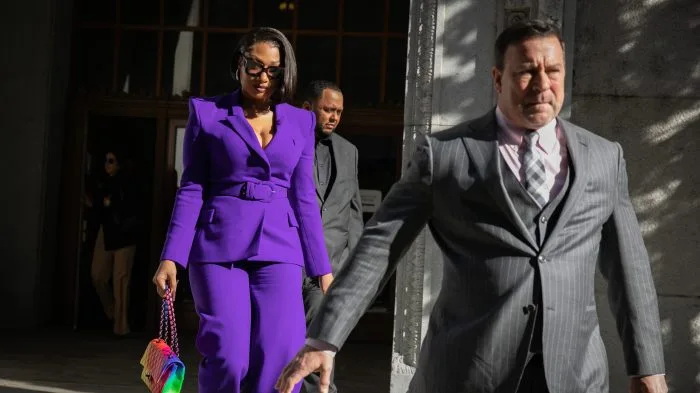After months of delays, which included swapping his legal team and attempting to remove the judge who presided over his case, rapper Tory Lanez was sentenced to 10 years in prison for the July 2020 shooting of Megan Thee Stallion.
In December 2022, Lanez, whose real name is Daystar Peterson, was found guilty on three felony counts — assault with a semiautomatic handgun, possession of a loaded, unregistered firearm, and discharging a firearm with gross negligence. Prosecutors had requested Los Angeles Superior Court Judge David Herriford sentence Lanez to 13 years in prison, while the rapper’s legal team asked that he be given probation or no more than three years.
After the sentencing, Los Angeles District Attorney George Gascón thanked Megan Thee Stallion, born Megan Pete, for her bravery.
“Over the past three years, Mr. Peterson has engaged in a pattern of conduct that was intended to intimidate Ms. Pete and silence her truths from being heard,” Gascón said. “Women, especially Black women, are afraid to report crimes like assault because they are too often not believed. I commend Megan Pete for her incredible bravery and vulnerability as she underwent months of probing investigation and court appearances where she had to relive her trauma, and the public scrutiny that followed. This case highlighted the numerous ways that our society must do better for women.”
While Lanez’s sentencing marks the end of this saga (well, until his probable forthcoming appeal is decided), this moment also illuminates another uncomfortable reality. The hip-hop community should be deeply embarrassed by the way it conducted itself during this entire ordeal. After all, the response to the shooting furthered decadeslong rhetoric about misogyny and violent masculinity that have permeated hip-hop for generations.
Making matters worse, disinformation is a valuable currency these days. Perhaps it’s always been, but with the influx of social media, disinformation now isn’t just inaccurate, it can be deadly.
Disinformation campaigns have had books about actual U.S. history removed from shelves. It’s been a critical tool to prevent commonsense gun laws. And disinformation is why a former president of the United States can rally millions of Americans behind him on the campaign trail as federal indictments pile up in multiple states and Washington. And disinformation allowed many to believe Lanez was the victim of a witch hunt, while Megan Thee Stallion feared for her safety and suffered from anxiety and depression.
But sadly, Megan Thee Stallion isn’t unique.
A study conducted by the Institute of Women’s Policy Research revealed that nearly a third of all women will experience some form of intimate partner violence in their lifetime. For Black women, that number is more than 40%. Complicating things even further are the factors that prevent many Black women from reporting their abuse: mistrust of police, protecting perpetrators, shame. Megan Thee Stallion was no different.
Weeks after the incident, leaked texts from Lanez seemingly apologizing for the shooting surfaced. However, his public tone was the polar opposite. Still, Megan Thee Stallion was initially reluctant to come forward to say he shot her, explaining she “tried to keep the situation off the internet,” but Lanez and his fans continued to spread false information about what happened that night.

Jason Armond/Getty Images
After Lanez allegedly attempted to pay Megan Thee Stallion and her former friend Kelsey Harris $1 million to keep quiet, Lanez tormented Megan Thee Stallion through his music. When she sat down with broadcaster Gayle King on CBS Mornings in April 2022 for an interview, Lanez released a video for his song, “CAP,” in which he chopped horse legs in a not-so-subliminal taunt. Rapper DaBaby, a once frequent collaborator with Megan Thee Stallion, and Lanez reportedly attempted to “ambush” her while she was on stage at Rolling Loud in Miami in 2021, violating the protective order she had against Lanez.
Lanez and his defense attorneys accused Megan Thee Stallion of lying — while also insinuating Harris was the actual shooter — but the jury didn’t buy it, rendering a verdict in less than 10 hours. Not even the embarrassing displays from Lanez’s father outside the courtroom, blaming entertainment agency Roc Nation for Lanez’s cowardly actions, could distract from what happened and what led to that moment.
Over the past three years, hip-hop artists have largely remained quiet about the shooting. Megan Thee Stallion’s peers have either been slow to admonish Lanez, have continued to work with him, or have been reluctant to defend her. Record executive Rick Ross, who initially called out Lanez following the shooting, eventually reconciled with him and invited Lanez to his car show last year. While performing the song “Litty Again” at Rolling Loud Portugal in July, Meek Mill yelled “Free Tory Lanez!” to the crowd. During the trial, DJ Akademiks published court documents and cast doubt on the validity of Megan Thee Stallion’s account to his large audience. Even rap’s biggest superstar, Drake, made light of the shooting last year on “Circo Loco,” insinuating that Megan was fabricating the entire ordeal.
Perhaps the only rapper to publicly call out Lanez, and stand by his words, is Bun B. “We have to protect our Black women, and any Black man that doesn’t feel the same way is not my brother,” the UGK legend said in December 2020.
Much of the conversation about the shooting and what precipitated it was fixated on who Megan Thee Stallion was romantically involved with — not why Lanez decided it was the best course of action to reportedly tell her, “Dance, b—!” while pulling the trigger multiple times. In September 2022, DaBaby claimed he was also sleeping with Megan on his track “Boogeyman” rapping, “You play with me, that s— was childish / The day before she say that Tory Lanez shot her, I was f—ing on Megan Thee Stallion / Waited to say this s— on my next album / Hit it the day before too / But I kept it playa, I ain’t say nothing ’bout it.”
Megan Thee Stallion appeared to respond to DaBaby’s blatant display of play for attention by saying she controlled her body — not Lanez, DaBaby or any other man. The irony here is that sexual relationships have historically been used as badges of honor in hip-hop, largely by men. In Megan Thee Stallion’s case, her personal life was being used as a vehicle to discredit her account of the shooting.
There are countless instances when men seek out the validation of other men, and women, particularly Black women, are the targets. That’s precisely what happened in this case, and the result is one of the ugliest stains on hip-hop’s history — though its past treatment of women is unfortunately littered with similar examples. Hip-hop has never held itself accountable for frequently disrespecting women (not to mention LGBTQ+ people), because what’s accountable isn’t always best for business.
We all watched Megan Thee Stallion have to defend herself — all while she was still grieving the losses of her great-grandmother and mother, who died within weeks of each other in 2019 (Megan said she and Lanez initially bonded over both of them losing parents). Her father died when she was 15. It was almost too much for Megan to bear.
“I don’t wanna be on this earth,” Megan Thee Stallion said during her testimony at Lanez’s trial. “I wish he woulda shot and killed me if I knew I would go through this torture.”
Her music reflected the same sentiments. “They keep sayin’ I should get help / But I don’t even know what I need,” she rapped last year on the aptly titled track “Anxiety.” “They keep sayin’ speak your truth / And at the same time say they don’t believe.”
It wasn’t until Lanez’s phone conversation with Harris while he was in jail became public that many finally began to accept what Megan has said since August 2020: Lanez shot her, and he knew he shot her.
In her victim impact statement, Megan told the court she had “not experienced a single day of peace” since the incident occurred. “He lied to anyone that would listen, and paid bloggers to disseminate false information about the case on social media. He released music videos and songs to damage my character and continue his crusade.”
Megan concluded, “For once, the defendant must be forced to face the full consequences of his heinous actions and face justice.”
Lanez’s sentencing is some semblance of justice. Mainly for Megan, who endured the torture of public scrutiny, confronted Lanez in court, and withstood multiple delays in his sentencing.
Lanez’s life and career are on an indefinite pause. And while there is a necessary, generations-long critique of the criminal justice system and how it has preyed on Black men to be had, Lanez is guilty of a violent crime. That’s his story. That’s his reality. That’s his legacy.
Nevertheless, hip-hop’s story, reality and legacy of this saga is far from over. Hip-hop culture changed the course of history and inspired every corner of the globe. Still, when it comes to its treatment of women, hip-hop still has a lot of work to do. Women such as rapper Dee Barnes, music producer Drew Dixon, and more aren’t just survivors of abuse at the hands of powerful men such as rapper and producer Dr. Dre and record executive Russell Simmons. They represent accomplished journalists and talented executives who have had to unfairly juggle the realities of their passions and the sharp, stinging legacies of their abuse. Whether that happens with Megan Thee Stallion is anybody’s guess.
Hip-hop should be embarrassed by its conduct during this incident. It should be ashamed it largely remained silent and allowed a Black woman to be publicly maligned. Whatever conversations are had now and in the future, here’s hoping it’s rooted in the truth — no matter how uncomfortable. That’s the only way conversations can become actions and eventually tangible change.
Loving hip-hop and critiquing it isn’t just a necessary part of the culture. If the genre is to survive another 50 years, then there’s no other option.


